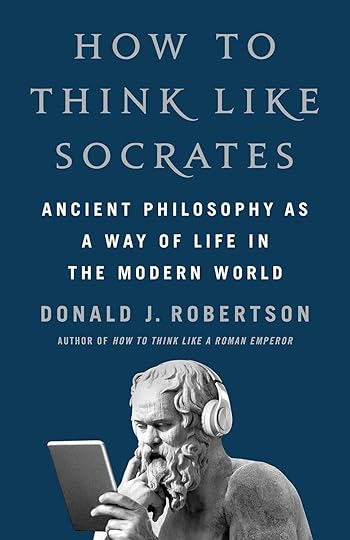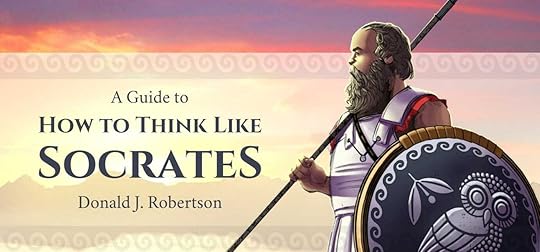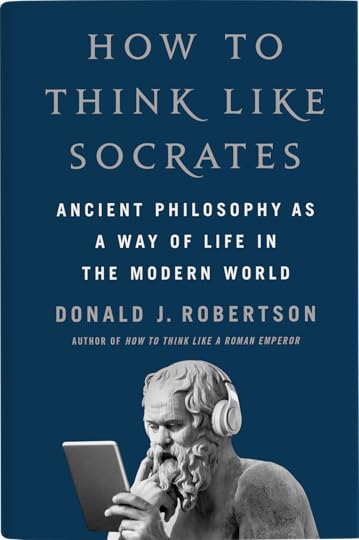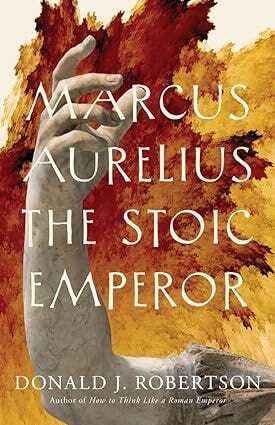Donald J. Robertson's Blog, page 6
May 13, 2025
How the Stoics Defined Anger
Our two main sources for Stoic theory are the chapter on Zeno in Diogenes Laertius’ Lives and Opinions of Eminent Philosophers and a the sections on Stoicism in the Anthology of Johannes Stobaeus, which is believed to draw upon an earlier work summarizing doctrines by the philosopher Areus Didymos. First, I’ll look at the central definition of anger given in each of these two texts and then we’ll explore the distinctions they go on to make between different species of anger.
Stoicism: Philosophy as a Way of Life is a reader-supported publication. To receive new posts and support my work, consider becoming a free or paid subscriber.
The Definition of AngerFirst of all, we should note, that the Stoics define anger as a subcategory of desire. Desire is defined in Diogenes Laertius as “an irrational impulse” or urge (ὁρμὴ ἄλογος, hormē alogos). The main word used for anger in Stoicism is ὀργὴ (orgē) in Greek.
Anger is a desire for revenge on one who seems to have wronged us inappropriately. — Diogenes Laertius
[ὀργὴ δ᾽ ἐπιθυμία τιμωρίας τοῦ δοκοῦντος ἠδικηκέναι οὐ προσηκόντως]
Alternatively, “Anger is a craving to punish someone who seems to have harmed us unjustly.” To be clear, this combines three closely-related judgments:
The belief that someone has harmed me, whether physically or by injuring my reputation or other interests.
The belief that he did so unjustly, i.e., he should not have done what he did.
The conclusion that he deserves to be punished, leading to my excessive urge or desire for revenge.
The Stoics believe that the first premise here, that I have been harmed, is false and irrational. Strictly speaking, nobody can truly harm us unless we permit them to do so. As Epictetus puts it, “People are distressed not by events but rather by their judgments about them.”
Our other main source, Stobaeus, defines anger in virtually the same language.
Anger, then, is a desire to take revenge on someone who appears to have wronged [you] contrary to what is appropriate. — Stobaeus
However, he says a little more about the nature of desire, according to the Stoics.
Desire is a striving which is disobedient to reason; its cause is believing that a good is approaching, and that when it is here we shall do well by it; this opinion itself ‹that it really is worth striving for› has a ‹fresh› [power] to stimulate irregular motion. — Stobaeus
This implies that anger is a desire disobedient to reason, caused by the belief that a good is approaching, presumably meaning that an angry person concludes that revenge is good. In other words, when I’m angry, I assume that it’s in my best interests, somehow, for my enemy to be punished, and made to suffer.
I think what Stobaeus means by a “fresh power” is that anger has a pronounced physiological effect. For instance, anger makes our “blood boil” (an “irregular motion” or agitation in the body), or more literally our blood pressure often rises significantly and our heart beats faster, but these physiological symptoms of anger may fade over time, even though the angry thoughts and beliefs may remain with us.
 Photo by Kalea Morgan on UnsplashTwo Types of AngerIncipient Anger
Photo by Kalea Morgan on UnsplashTwo Types of AngerIncipient AngerThe Stoics also distinguished between several forms of anger. For example, Diogenes Laertius mentions an important distinction between anger (ὀργὴ) as a full-blown passion and the first flash of anger that someone experiences (θυμός).
And ‘incipient anger’ [θυμός] is anger just beginning.
This term (θυμός, thumos) is commonly translated as “spiritedness” in Plato’s Dialogues but in these passages it seems intended to correspond with what the Stoics call the propatheiai or “first movements” of a passion such as anger. These are involuntary and to be viewed as natural and morally indifferent. They roughly correspond to what we might today describe as the automatic thoughts and feelings that occur during the initial phase of anger. (This can also be compared to the modern concept of the “fight or flight response” or “primary threat appraisal” in psychology.)
Chronic Anger‘Chronic anger’ [μῆνις] is long-standing and spiteful anger which just waits for its chance, as is apparent in these lines [from Iliad 1.81–2]: ‘For even if he swallows his resentment for today, still he will retain his spite in the future, until it is satisfied.’
There may not be an English word that adequately translate this concept of μῆνις (menis). It’s fairly clear, however, that the Stoics are distinguishing, in part, between what psychologists today call “state” and “trait” anger. Anger that is long-standing or part of our character is trait-like rather than merely a passing state. In other words, μῆνις is an enduring character trait whereas ὀργὴ is anger as a state of mind. However, whereas “state anger” refers to a chronic disposition to become angry, μῆνις tends to denote something more intentional, such as a lasting vendetta against someone.
ConclusionSo we have three basic forms of anger:
θυμός, thumos, incipient anger, the initial involuntary phase of the emotion
ὀργὴ, orgē, anger, the standard term used for anger as an emotional state of mind
μῆνις, menis, chronic anger, an angry personality trait or long-standing disposition
For Stoics, the initial phase of the emotion, or proto-passion, is involuntary and only becomes a full-blown emotion when reason goes along with it and gives assent to the accompanying impressions. This is not unlike the modern cognitive appraisal theory of emotion, which holds that the fight or flight response may trigger sympathetic nervous system arousal, such as increased heart rate, and so on, but does not really become an emotion until we interpret the situation and begin to think of our initial feelings either as anger or fear.
Thanks for reading Stoicism: Philosophy as a Way of Life! This post is public so feel free to share it.
May 8, 2025
Sophists in the Manosphere
In the following modified excerpts from my recent book, How to Think Like Socrates, I discuss some similarities in the language used by ancient Sophists and modern influencers in the Manosphere. The ancient Sophists mainly earned a living by teaching privileged adolescent boys. Perhaps inevitably, they appear at times to have exploited their young students’ natural insecurities about being sufficiently manly.
The first excerpt below comes from the Introduction and sets the stage for a series of excerpts from a dialogue between Socrates and several Sophists. This conversation is closely based on the text of Plato’s Gorgias. Classical scholars have noted that Plato appears to drop several hints that the characters in this dialogue are meant to be taken as representative of a class of young men, influenced by the Sophists, who include certain well-known Athenian statesmen. In these excerpts, I therefore took the liberty of attributing the arguments to one of the most controversial of these historical figures, one of the so-called Thirty Tyrants, known as Critias.
Stoicism: Philosophy as a Way of Life is a reader-supported publication. To receive new posts and support my work, consider becoming a free or paid subscriber.
Ancient Athens and Modern SocietyAs I became more interested in Socrates’s life and the period in which he lived, I was struck by how many parallels there are with recent history. The Athens of Socrates was a fledgling democracy, in which the basic strengths and weaknesses of that system were laid bare. Their city initially flourished, and built up strong alliances, under the leadership of great statesmen, in whom the people believed wholeheartedly. Following the outbreak of a great war and a devastating pandemic, however, their trust in government was shaken, leading to a split between two political factions that became more extreme and polarized as they fought for control of the state. The political and legal systems of Athens strained under the weight of corruption, as their flaws were exploited to the maximum. Demagogues soon realized that populist measures and emotive rhetoric could be used to manipulate the people and to swing votes in the Assembly, by pandering to human weaknesses such as greed, fear, and anger.
A curious hybrid of political and self-improvement rhetoric evolved, which encouraged privileged young men to view contempt for their perceived inferiors as something “strong” and “manly.”
Professional advisors, the Sophists, became increasingly famous, and staggeringly wealthy, by teaching politicians the art of persuasion. These men gave celebrated speeches themselves, which often exploited common insecurities and prejudices. A curious hybrid of political and self-improvement rhetoric evolved, which encouraged privileged young men to view contempt for their perceived inferiors as something “strong” and “manly.” The violent suppression of foreign nations abroad and total loss of faith in the democratic process at home led, in due course, to armed coups, political purges, and even civil war. Socrates didn’t explicitly align himself with any political faction or system of government, but rather his main concern was whether or not those wielding power possessed the wisdom and virtue that might make them competent to be in charge. He was, however, forced to watch as Athenian democracy was first hijacked by demagogues and then reverted to an “oligarchy,” or rule by the few, which ultimately collapsed into “tyranny,” or what we call “authoritarianism.”
 The recent Netflix series Adolescence touched on the similar issuesSocrates versus the SophistsCritias on Manliness
The recent Netflix series Adolescence touched on the similar issuesSocrates versus the SophistsCritias on Manliness“The words of a political orator,” Socrates had said, “are made to twist this way and that, just to avoid displeasing the people by contradicting their changing mood. Philosophy never changes. Her statements may appear surprising and paradoxical, but they are consistent. She tells us that committing wrongdoing is a worse evil than suffering it at the hands of another. And I swear by the dog, Critias, that if you allow her assertion to go unrefuted, you will never be at peace with yourself. For my own part, I would rather be out of tune with a whole chorus, and have the rest of humankind contradict me, than be out of tune with a single individual, by contradicting myself.”
“Socrates,” replied Critias, “you sound like a demagogue yourself. Despite what you just said about disregarding the chorus of humankind, your whole argument depends upon an appeal to popular opinion. In nature, real men never become victims, because they are strong. Hence, being the victim of injustice is a greater evil than committing injustice.
“When wronged and insulted those who are weak and slavish can neither defend themselves nor anyone for whom they care. For this reason, the weak, who are many, have conspired against the strong, who are few, by making up moral conventions concerning what is just. For instance, the majority fabricated the idea that it is unjust and shameful for the strong to take a greater share. Throughout history, however, the strong have asserted their right to conquer the weak. They take what they like, in accord with the law of nature, and against the laws and conventions established by their inferiors.”
Critias continued: “In order to indoctrinate everyone in these rules, the Athenian people take the best and strongest men and, from an early age, tame them just as men tame lion cubs reared among them. They enslave them by teaching them that men ought to be equal and other unnatural nonsense. Whenever a man is born who is sufficiently strong, though, he shakes off these spells, breaks his chains, and tramples on their conventions. From time to time, a great man will dazzle the people by revealing himself to be their master rather than their slave. The law of nature, as Pindar says, rules over men and gods alike, and has set it down once and for all that might is right.
“You are only blinded to the truth of this by your love of philosophy, a pleasant game for children, perhaps, but one sure to ruin you if you keep it up much longer. Indeed, no matter how naturally talented a youth may be, if he wastes his time in your company studying philosophy, he will never become a real man. He will never be respected by his inferiors and will lack any influence in the courts and Assembly. That is what is shameful, Socrates. I feel toward your students as I do toward grown men who talk with a lisp like some little child— they deserve to be whipped for such unmanly behavior!
“Now, I like you, Socrates,” said Critias, looking down his nose, “so let me give you some advice. You have neglected yourself when it comes to rhetoric and oratory. Your noble soul appears to others like that of a foolish child because of the unsophisticated manner in which you speak. You cannot contribute a single word of value to the deliberations of a court or persuade a single citizen in the Assembly of your cause. So do not take offense at my frankness. Are you not ashamed of the plight you find yourself in because of your philosophy? If someone were to have you arrested and dragged off to prison right now, you would be completely helpless. You would stand in court with your mouth gaping open, without the words to defend yourself. No matter how false and unjust the charges, if the prosecution uses rhetoric, and they want you to die, the jury will condemn you to die.”
Socrates RepliesSocrates smiled. “Critias, I thank you,” he said, “for I have come to believe that if I wish to test whether I am living well or badly, I require three qualities from a partner in conversation: wisdom, goodwill, and frankness. Gorgias and Alcibiades may be wise and well-intentioned but, as you observed, they did not speak freely enough. They were ashamed of contradicting social conventions but ended up contradicting themselves. I doubt, by contrast, that you would ever be inhibited by shame. So if I can convince you to agree with me, my friend, we shall know we have indeed arrived at the truth.
“Let’s start by clarifying how you define natural justice. Am I correct that you believe this consists in the stronger taking the property of the weaker by force, the better ruling over the worse, and nobles having more than the common people— that might is right?” Critias agreed. Socrates next asked if Critias was saying that “better” and “stronger” were the same. Critias explained that a larger city attacking a smaller one is both stronger and better, as it deserves to win. “Surely,” said Socrates, “just as a large city is stronger than a small one, the common people, who are many, are stronger than the nobles, who are few?” Critias waited a moment, then nodded.
“Then,” said Socrates, “the laws imposed by the stronger are the same as those imposed by the majority. The majority, according to you, believe that justice consists in equality and that it is a more shameful thing to do what is unjust than to suffer injustice. Surely it follows that these beliefs are derived not only from convention but also, as you would have it, from nature? You said earlier that convention and nature are opposed in this regard but now you seem, do you not, to be contradicting yourself?”
“There is no end to this rubbish!” scoffed Critias. “Are you not ashamed, Socrates, to be playing word games? I told you that by stronger I meant better. Did you really think I meant that if you gathered together a heap of slaves and common rabble, with muscle but no brains, that whatever they say should have the force of law?” “Let me help,” said Socrates. “Did you actually mean wiser, and better, rulers, when you said stronger men?” “Of course,” said Critias. “So one wise man is superior to thousands of fools, and should rule them like a tyrant, and take the lion’s share of everything they own?” “Exactly,” said Critias, “natural justice consists in wiser and better men ruling over their inferiors.”
“Suppose many of us gathered with a large amount of food, and someone present was a physician with expertise in the field of human nutrition. Would he be wise simply to claim the lion’s share of the food and consume it all himself? Or would wisdom consist in distributing to each person, including himself, the most appropriate amount of food, for the benefit of each individual’s health? Does wisdom consist in exercising rational moderation or indulging in excess?” “You’re going on about food and drink, and other such nonsense, but that’s not what I meant,” complained Critias. “We are talking about expertise,” he added, “in running the affairs of the whole city.” “So what you intended to say is that the better men are wiser with regard to ruling cities?” asked Socrates. Critias agreed.
“Well, then, is there no need for self-mastery as long as one is master of others?” asked Socrates. “What do you mean?” said Critias. “Do your rulers rule themselves wisely?” asked Socrates. Critias frowned irritably, his head cocked to one side. “How can you be happy if you have to deny yourself pleasure?” he exclaimed. “Any man who actually wants to live like a man ought to go out and satisfy his appetites as much as he likes. The majority just lack the strength to do this. They may praise moderation but it is not a ‘virtue’ fit for free men. In all truth, Socrates, to those who wield absolute power, such as political tyrants, what could be more disgraceful than moderation and justice? No real man would voluntarily subjugate himself to the values of slaves. Your idea of self-mastery is contrary to nature. It is a lie invented by the naturally slavish and weak who joined forces in a conspiracy against their masters, the strong, in an attempt to shame them into submission.”
“Many people share these opinions,” said Socrates, “but are too ashamed to state them in public. So again, I am grateful to you, my friend, for your frankness. You are saying that the strong should indulge their passions and appetites as much as they like, are you not?” “Of course!” snorted Critias, as if what he said were common sense. “Answer me this,” said Socrates, “does a man who has an itch, and the power to scratch it as often as he likes, live a good life in that regard?” “How bizarre of you, Socrates,” replied Critias, “and how vulgar but, yes, let us say that even a man who scratches constantly would live a pleasant and happy life!”
“Don’t you see that admitting your mistakes, for the health of your own soul, is like swallowing bitter medicine for the good of your body?” said Socrates. “I’m not remotely interested, Socrates,” Critias scoffed. “They say you shouldn’t leave a story half told,” smiled the philosopher. “I’m not answering any more of these childish questions, Socrates,” snapped Critias. “In that case,” said Socrates, “I must take your place and answer my own questions if I want to finish our discussion. I do so, however, on condition that you all agree to challenge me if I say anything that appears false. If you prove me wrong, I will consider you among my greatest benefactors.” Gorgias and the others agreed.
Socrates Concludes“Listen then as I recap. Critias and I agreed that pleasure cannot be identical with the good. A good man will be just and moderate, and he will therefore flourish. Such a person will be the opposite of the unrestrained tyrant whose freedom you earlier praised. The unjust and unrestrained man will not deserve and will never truly acquire the love and friendship of his fellow men. Wise men recognize, Critias, that the world is organized by the laws of nature, and humankind is organized by communities and bonds of friendship. So the law of nature is not really selfish as you claimed but rather embraces moderation, justice, and friendship toward others.
“What you accused Alcibiades of admitting out of shame turns out to be true after all: inflicting injustice is not only more shameful but also does us more harm than suffering injustice at another’s hands. A good orator must therefore be wise and just himself, and understand what is right and wrong, before attempting to influence others. Only someone who has studied justice, such as a philosopher, would be qualified to employ oratory for good. Otherwise, a political orator, who is ignorant of what is actually good for the citizens, merely persuades them of what appears right to him.”
How to Think Like Socrates is now available from all good bookstores, in ebook, and hardback formats. You can listen to a preview of the audiobook on Audible.

Thanks for reading Stoicism: Philosophy as a Way of Life! This post is public so feel free to share it.
Stoicism: Philosophy as a Way of Life is a reader-supported publication. To receive new posts and support my work, consider becoming a free or paid subscriber.
May 3, 2025
The Stoicism of Thomas Jefferson
Epictetus and Epicurus give laws for governing ourselves… — Jefferson
 Public domain. Reproduced from Wikimedia Commons
Public domain. Reproduced from Wikimedia CommonsI’m staying near Washington DC at the moment and took the opportunity to visit the Thomas Jefferson’s Library exhibit at the Library of Congress. I’m the author of several books on Stoicism, including How to Think Like a Roman Emperor: The Stoic Philosophy of Marcus Aurelius. I know that Jefferson, like some of the other Founding Fathers, was well-read in classical philosophy, so I naturally wondered what he thought of Stoicism, the philosophy that most influences me.
However, it’s generally assumed that Jefferson was a follower of Epicurus’ philosophy because he owned several texts on the subject and, in 1819, wrote a letter to William Short stating: “I too am an Epicurean”. In the same letter, although he praises Seneca as a “fine moralist”, he also criticizes certain aspects of Stoicism. Nevertheless, there are obvious Stoic influences in Jefferson’s writings. Indeed, in the same letter he praises the Stoic Epictetus, stressing that he has “given us what is good of the Stoics”, and that he even wished to create a new translation of Epictetus’ works.
 Public Domain. Digital Scan of Jefferson’s letter containing the Rules
Public Domain. Digital Scan of Jefferson’s letter containing the RulesA year before he passed away, in 1825, Jefferson was asked by a father to provide advice for his young son. (Who was his namesake, incidentally: Thomas Jefferson Smith.) Jefferson’s letter to the boy concludes with a set of rules. Jefferson gave them the rather unwieldy title “A Decalogue of Canons for Observation in Practical Life”. However, that just means: Ten Rules to Follow in Daily Life. As we’ll see, although Jefferson had written quite scathingly of Stoicism six years earlier, his advice to this young man contains ideas that appear more Stoic than Epicurean.
Jefferson’s Ten Rules for Daily LifeNever put off till tomorrow what you can do to-day.
Never trouble another for what you can do yourself.
Never spend your money before you have it.
Never buy what you do not want, because it is cheap; it will be dear to you.
Pride costs us more than hunger, thirst and cold.
We never repent of having eaten too little.
Nothing is troublesome that we do willingly.
How much pain have cost us the evils which have never happened!
Take things always by their smooth handle.
When angry, count ten, before you speak; if very angry, an hundred.
Jefferson and StoicismThe phrase “take things by their smooth handle”, in particular, will be immediately recognized by any student of Stoic philosophy. It’s obviously a paraphrase from one of the books in Jefferson’s personal library: the Enchiridion or Handbook of the philosopher Epictetus.
Everything has two handles, the one by which it may be borne, the other by which it may not. — Enchiridion, 43
Julian P. Boyd the historian who edited his papers also arrived at the conclusion that Jefferson must have derived this rule from Epictetus. So what does it mean? Well, Epictetus continues:
If your brother acts unjustly, do not lay hold of the act by that handle wherein he acts unjustly, for this is the handle which cannot be borne: but lay hold of the other, that he is your brother, that he was nurtured with you, and you will lay hold of the thing by that handle by which it can be borne.
In other words, don’t think about other people’s actions by focusing on ideas such as “what he did was wrong” or “what he did was unjust”. Rather focus on ideas that help you to deal more constructively with the situation.
More generally, the Stoics would say that we should avoid making strong value judgements or using emotive language in a way that’s merely upsetting — that’s the “rough” or broken handle. Instead, we should learn to take a step back, suspend emotive value judgements of this kind, and view things as honestly and objectively as possible — that’s the “smooth” handle, the usable one, which leads to practical wisdom and rational problem-solving.
The Other Nine RulesWhat about Jefferson’s other nine rules? Well, they don’t mention Stoicism as explicitly but they’re generally consistent with that philosophy. Moreover, several of them are very similar to other prominent aspects of ancient Stoic wisdom. Jefferson owned and had presumably read copies of The Discourses and Enchiridion of Epictetus as well as the writings of Stoics Seneca and Marcus Aurelius, and the works of Cicero who, though not a Stoic himself, wrote extensively and sympathetically about their philosophy.
“Never put off till tomorrow what you can do to-day.”
One of the major themes of Stoicism is the idea that we should bear in mind our own mortality, that life is fleeting. We must therefore pay more attention to our own actions in the here and now. Marcus Aurelius, for instance, criticizes himself for acting as though “you would rather become good tomorrow than be so today (Meditations, 8.22). Indeed one of his most quoted sayings is that “No more of all this talk about what a good man should be, but simply be one!” (Meditations, 10.16).
“Never trouble another for what you can do yourself.”
The Stoics frequently emphasize that we should take responsibility for our own lives. As Epictetus says:
Yes, but my nose runs. For what purpose then, slave, have you hands? Is it not that you may wipe your nose? — Discourses, 1.6
We should not wait for help from others but learn to be self-reliant and to take action where necessary.
“We never repent of having eaten too little.”
Stoicism evolved out of the austere Cynic philosophy, which preceded it. Like the Cynics, the Stoics were known for eating a simple diet and training themselves to control their appetite. For example, we’re told of the Stoic teacher Musonius Rufus:
He often talked in a very forceful manner about food, on the grounds that food was not an insignificant topic and that what one eats has significant consequences. In particular, he thought that mastering one’s appetites for food and drink was the beginning of and basis for self-control. — Lecture, 18
Stoics like Epictetus made the virtue of temperance, or moderation, the basis of their training. They believed that without self-control in basic matters such as our daily use of food and drink we inevitably lack the self-discipline required to exercise wisdom more generally in our lives.
“When angry, count ten, before you speak; if very angry, an hundred.”
The Stoics believed that anger was perhaps the most dangerous of the unhealthy passions. We have an entire book on the subject that survives today by Seneca called On Anger. In it he claims that the first Roman emperor, Augustus, who had trained in Stoicism, though known for violence earlier in life, learned to conquer his anger.
The late Emperor Augustus also did and said many memorable things, which prove that he was not under the dominion of anger. — On Anger, 3.23
Although Seneca doesn’t mention it in his book, we know from another source that Augustus’ Stoic tutor showed him basically the same technique that Jefferson describes in his rules:
ConclusionAthenodorus, the philosopher, because of his advanced years begged to be dismissed and allowed to go home, and Augustus granted his request. But when Athenodorus, as he was taking leave of him, said, “Whenever you get angry, Caesar, do not say or do anything before repeating to yourself the twenty-four letters of the alphabet,” Augustus seized his hand and said, “I still have need of your presence here,” and detained him a whole year, saying, “No risk attends the reward that silence brings.” — Plutarch, Moralia, Sayings of Romans: Caesar Augustus
A couple of people have pointed out to me that in various letters, Jefferson would draw up recommended reading lists. These include the works of Cicero, texts dear to his heart which contain much Stoic influence, and also the Memorabilia of Socrates, dialogues which particularly influenced the Stoics. However, Jefferson also specifically recommends reading the Letters and Essays of Seneca, the Enchiridion of Epictetus, and The Meditations of Marcus Aurelius — all the major surviving Stoic texts in fact.
Jefferson did identify more with Epicureanism than with Stoicism, at least at one point in his life. However, he was evidently more interested in Stoicism and influenced by its teachings than is generally recognized. He studied all of the major surviving Stoic texts and encouraged others to do so also. More importantly, though, he found the Stoic teachings of Epictetus, in particular, valuable as a guide to living wisely, and continued to draw upon them in the advice he gave to others.
 Reproduced under CC BY-SA 4.0 from Smash the Iron Cage on Wikimedia Commons
Reproduced under CC BY-SA 4.0 from Smash the Iron Cage on Wikimedia Commons
May 2, 2025
Download "A Guide to How to Think Like Socrates"

We worked with several graphic designers and artists to create this free fourteen-page guide to the life and thought of Socrates — just for you! It’s the perfect introduction to my latest book How to Think Like Socrates. Just click on download button below to get your hands on the PDF.
A Guide To How To Think Like Socrates4.46MB ∙ PDF fileDownloadDownload our free fourteen-page illustrated guide to the life and thought of Socrates.DownloadContentsKey Events – Some of the occurrences that shaped Socrates’ life and thought.
Characters – The most important characters in How to Think Like Socrates.
Practical Advice – Summarizing the main self-help techniques described in the book.
What Next? – Suggested questions and recommended reading for further study.
The book on which this guide is based, How to Think Like Socrates, is now available in hardback, ebook, and audiobook formats. Read the reviews on Goodreads.
There are certain tiny creatures that can bite or sting us, without even being noticed. We feel nothing, and no wound is visible. Only much later do we discover, to our surprise, an itch or swelling where it seems we must have been bitten. You once told me, Socrates, that would be my experience when dealing with the wise. —How to Think Like Socrates
Stoicism: Philosophy as a Way of Life is a reader-supported publication. To receive new posts and support my work, consider becoming a free or paid subscriber.

Thanks for reading Stoicism: Philosophy as a Way of Life! This post is public so feel free to share it.
May 1, 2025
How did you view these misfortunes when they befell others?
CommentaryWhat the will of nature is may be learned from a consideration of the points in which we do not differ from one another. For example, when some other person’s slave-boy breaks his drinking-cup, you are instantly ready to say, “That’s one of the things which happen.” Rest assured, then, that when your own drinking-cup gets broken, you ought to behave in the same way that you do when the other man’s cup is broken. Apply now the same principle to the matters of greater importance. Some other person’s child or wife has died; no one but would say, “Such is the fate of man.” Yet when a man’s own child dies, immediately the cry is, “Alas! Woe is me!” But we ought to remember how we feel when we hear of the same misfortune befalling others.
This is similar to what’s called the double-standards strategy in cognitive therapy, where we ask individuals to consider whether they may be judging themselves differently than they would judge others, or applying a different rule to themselves than to others.
April 29, 2025
The Stoic Synonyms
The early Stoics, particularly Zeno of Citium, were known for employing very simple and concise arguments. We’re told that someone once complained that their arguments were too abrupt, presumably compared to the rambling dialogues typical of Academics and the Sophists’ notoriously long-winded and ornate speeches. Zeno, half-joking, replied: “You speak the truth, but if possible their syllables should be abbreviated too.” If he could, that is, he would have made his reasoning even more concise. For this reason, in part, the Stoics were said to speak like Spartans, i.e., laconically. They seem to have believed that our philosophical reasoning should be condensed, so that it can easily be memorized and recalled. Complex and elaborate arguments might win praise in Plato’s Academy but you won’t have them ready to hand if you need help coping in the real world.
 Photo by Miltiadis Fragkidis on Unsplash
Photo by Miltiadis Fragkidis on UnsplashIn Diogenes Laertius’ life of Zeno, we find a highly compressed argument employing the method known as synonymia, which proceeds by asserting that a series of different terms are synonymous, or nearly synonymous. These passages can be difficult to interpret because they often depend on semantic nuances of the ancient Greek language, which are lost in translation. In some cases the original meaning remains quite unclear. Nevertheless, here is one possible translation of a key Stoic argument based on synonyms for man’s highest good:
And all that is good [according to the Stoics] is advantageous [συμφέρον, sympheron], appropriate [δέον, deon], profitable [λυσιτελές, lysitelês], useful [χρήσιμον, chrêsimon], well-used [εὔχρηστον, euchrêston], honorable [καλόν, kalon], beneficial [ὠφέλιμον, ôphelimon], choiceworthy [αἱρετόν, haireton], and just [δίκαιον, dikaion].
Stoicism: Philosophy as a Way of Life is a reader-supported publication. To receive new posts and support my work, consider becoming a free or paid subscriber.
We’re then told precisely what is meant, in this context, by each of these terms. I’m going to divide the passage up, therefore, and comment on each aspect of the good in turn. For the Stoics, “the good” for humans is synonymous, first and foremost, with wisdom or virtue. I think it helps to bear that in mind when considering these other synonyms, so I’ll try to explain them by relating them primarily to the Stoic concept of virtue.
Advantageous because it brings things that, when they occur, benefit us.
I think the point here is that virtue is advantageous, in the sense of being expedient, because as well as being an end in itself it serves as a means of creating other things that are beneficial for flourishing. Virtue creates virtue; vice creates vice. Wisdom and virtue perpetuate themselves. Virtue does not lead to vice.
Appropriate because it holds things together in the way that is needed.
The word here, deon, means what is appropriate or fitting, but it also implies a duty. Virtue is our duty, it is always appropriate and morally binding, because it gives our life the type of coherence, or integrity, necessary for human flourishing. This seems related to the notion of the constancy of the ideal Sage, who is free from hypocrisy or contradiction. (Vice, by contrast, is divisive and contradictory.)
Profitable because it repays the costs incurred for it, such that the return derived from the effort surpasses the cost.
Virtue is always a good investment. Its intrinsic value inherently outweighs any expense incurred in obtaining it. No matter how much effort is required to live virtuously, it is a negligible cost compared to the benefits we reap.
Useful because it furnishes us with the means for benefiting ourselves.
Virtue gives us all the tools we need in order to flourish and fulfil our true goal in life. Wisdom, in other words, is the most useful thing in life because it allows us to use everything else well.
Well-used because it renders its use praiseworthy.
Virtue is always well-used or artfully-used, because it is precisely virtue itself that renders the use of anything else praiseworthy. The indifferents, by contrast, can be used either well or badly. Folly and vice can never be used well, but wisdom and virtue, by their nature, can never be used badly.
Honorable because it possesses due measure in relation to its own function.
The Greek word kalon means both honorable and beautiful, and the Stoics probably intend both meanings. Virtue is beautiful because it is in perfect harmony with its own true purpose. It has everything that nature intended humans to achieve in order to be complete, and flourishing. Honor and (moral) beauty also makes their possessor genuinely praiseworthy. Vice is never praiseworthy; virtue, in itself, is never ugly or contemptible.
Beneficial because it is such as to confer benefit.
Virtue helps us, whereas vice harms us. By its very nature it is beneficial, or “good for us”. We might say virtue is fundamentally healthy for us, because it constitutes our flourishing. Vice never benefits us; virtue never harms us. The indifferents, such as wealth and reputation, are only beneficial or harmful insofar as they’re used well or badly by us.
Choiceworthy because it is such that one would reasonably choose it.
This means that virtue is always worth choosing, or that we should choose it, if we are living in accord with reason. Virtue is the only rational choice if we want to flourish. Virtue is what a wise person, living consistently in accord with reason, would choose to value above everything else. It is never rational to choose vice.
Just because it is in accordance with law and productive of community.
Virtue is just, or the right thing to do, because it is consistent with natural law, and it allows us to live in harmony with the rest of mankind. Virtue is the path that leads toward the brotherhood of mankind, and the cosmopolis or universal city of Zeus.
 Photo by Boba Jaglicic on Unsplash
Photo by Boba Jaglicic on UnsplashIt’s long struck me that the synonyms for our “good”, or virtue, in Stoicism can be divided into two main categories:
What is honorable, or morally good
What is healthy, or good for us
It’s particularly important for the Stoics to maintain that, in some fundamental sense, what is honorable and what is healthy coincide. Vice is not only bad for society but also bad for the individual. Virtue is not only good for society but also good for the individual. As Marcus Aurelius famously put it: “What is not good for the hive is not good for the bee.”
Thanks for reading Stoicism: Philosophy as a Way of Life! This post is public so feel free to share it.
April 26, 2025
The Marcus Aurelius AMA is Now Open
You can now participate in the Stoicism Subreddit’s AMA (ask me anything) commemorating the birthday of Marcus Aurelius. I’ll be answering questions along with Prof. Christopher Gill and Dr. Gregory Sadler.
From the redditors:How to Participate
Please submit your questions in the thread, ideally before 1PM EDT (5PM GMT) on Saturday.
Panelists will begin respond starting from roughly 1PM EDT (5PM GMT) as time and individual schedules permit. (If you've clicked to RSVP, you will receive a notification at this time advising you that it's started.)
Thoughtful follow-up questions and scholarly discussion are welcome.
All Sincere Questions Are Welcome.
Stoicism: Philosophy as a Way of Life is a reader-supported publication. To receive new posts and support my work, consider becoming a free or paid subscriber.

Thanks for reading Stoicism: Philosophy as a Way of Life! This post is public so feel free to share it.
April 24, 2025
Join us for a Marcus Aurelius AMA on Reddit
Join me this Saturday, 26th April, on the Stoicism Subreddit, with Prof. Chris Gill and Dr. Greg Sadler, for an AMA (ask me anything) about the life and thought of Marcus Aurelius.
The Stoicism community on Reddit have organized this event to celebrate Marcus Aurelius’ birthday. You can find more details there by reading their announcement post.
Stoicism: Philosophy as a Way of Life is a reader-supported publication. To receive new posts and support my work, consider becoming a free or paid subscriber.

Thanks for reading Stoicism: Philosophy as a Way of Life! This post is public so feel free to share it.
The Stoicism of Descartes
 Modified public domain image, courtesy of Wikimedia Commons
Modified public domain image, courtesy of Wikimedia CommonsIn the 17th century, Rene Descartes, the father of modern philosophy, described how his famous epistemological meditations led him to develop a moral code, based upon three central maxims.
The first two of these refer to respect for custom and consistency in life. However, Descartes’ account of his third maxim provides a remarkable expression of certain ideas that have a markedly Stoic flavour.
In the third chapter of his Discourse on Method, he writes:
My third maxim was always to try to conquer myself rather than fortune, and to change my desires rather than the order of the world, and generally to accustom myself to believing that there is nothing that is completely within our power except our thoughts, so that, after we have done our best regarding things external to us, everything that is lacking for us to succeed is, from our point of view, absolutely impossible. And this alone seemed to me sufficient to prevent me in the future from desiring anything but what I was to acquire, and thus to make me contented.
He continues by explaining that we tend by nature to desire only what we perceive as within the realms of possibility. In some cases it’s obvious that something is, for all practical purposes, unachievable. We all accept that it’s pointless to desire things that we know are totally beyond our power — like wishing we’d been the first man on the moon. That would be absurd. However, in many cases the situation appears more ambiguous.
Nevertheless, if we were to regard everything external to us to be equally beyond our power, says Descartes, we would have no more regret about lacking those of which we’re deprived “than we have in not possessing the kingdoms of China or Mexico”.
…making a virtue of necessity, as they say, we shall no more desire to be healthy if we are sick, or to be free if we are in prison, than we do to have a body made of a material as incorruptible as diamonds, or wings to fly like birds.
This is one form of the Stoic contemplation upon necessity and determinism. It is clear, as the ancient philosophers observed, that nobody really feels pity for an infant because it cannot yet walk or speak, although we may feel differently about an adult who is mute or lame. People do not become frustrated because they cannot grow wings and fly but they do often envy the wealth and possessions of others.
And this alone seemed to me sufficient to prevent me in the future from desiring anything but what I was to acquire, and thus to make me contented.
Accepting that something is outside of our control often seems to mean that we give up our desire for it but people often seem to torture themselves with goals that, although possible for other people or for them at another stage in life, are not currently within their power to achieve. For example, many people wish they could change the past, or wish that they were rich and famous, demands which are either illogical, physically impossible, or unrealistic given the limitations of their current circumstances.
Descartes continues by admitting that “long exercise is needed as well as frequently repeated meditation, in order to become accustomed to looking at everything from this point of view”. However, he says that he believes that it was mainly in this practice that the secret of certain philosophers consisted “who in earlier times were able to free themselves from fortune’s domination and who, despite sorrows and poverty, could rival their gods in happiness.” This could apply to many ancient philosophers, although his remarks bear an obvious resemblance to the way that the Stoics were traditionally described.
For occupying themselves ceaselessly with considering the limits prescribed to them by nature, they so perfectly persuaded themselves that nothing was in their power but their affection for other things, and they controlled their thoughts so absolutely that in this they had some reason for reckoning themselves richer, more powerful, freer, and happier than any other men who, not having this philosophy, never thus controlled everything they wished to control, however favoured by nature and fortune they might be.
In short, when it is beyond our power to obtain something we should admit it clearly and unambiguously to ourselves. We should not allow our desire to linger on because of some ambiguity. Like a fish that slips through our nets, we should accept that it is gone for good. Perhaps it once seemed possible that it could be ours but it is no longer so. In that case, rather than continuing to desire it we should file it away under the category of “absolutely impossible” so that we can forget about it and move on.
April 17, 2025
Meditation and Anger in Stoicism and Buddhism
Donald speaks with Matthew Gindin, writer, editor, and former Buddhist monk. We talk about Buddhist teachings on anger and the parallels between Buddhist and Stoic contemplative meditation practices.
 Philosophy As TherapyI explore philosophies both "eastern" and "western" as therapy for the mind and character, always with an eye to practical application, and informed by my own imperfect attempts.By Matthew Gindin
Philosophy As TherapyI explore philosophies both "eastern" and "western" as therapy for the mind and character, always with an eye to practical application, and informed by my own imperfect attempts.By Matthew GindinStoicism: Philosophy as a Way of Life is a reader-supported publication. To receive new posts and support my work, consider becoming a free or paid subscriber.

Thanks for reading Stoicism: Philosophy as a Way of Life! This post is public so feel free to share it.



